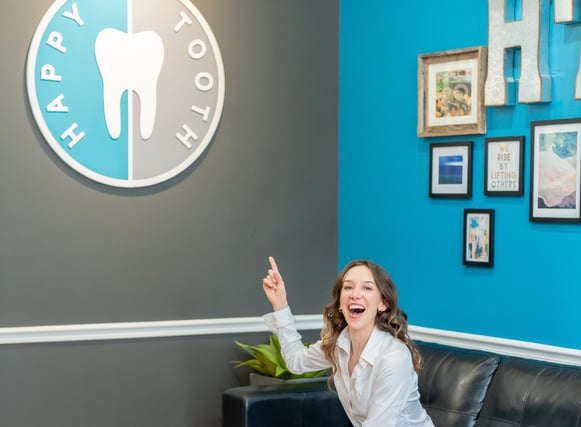
Having a good support system around you is one of the key players to success as a young dentist. This includes a good mentor, or even better, mentors. Going from dental school to practicing is like learning how to swim in a pool then being thrown in the ocean- you may know the basics, but there’s a lot of unfamiliar situations that present. This is when it is incredibly valuable to have someone to call on. Remember that a mentor isn’t one-size-fits all; you may have one person you go to for questions on patient management and another for complex treatment planning. You may also find it advantageous to have mentors of varying experience levels i.e. 2, 5, 10 years out of school or in different career placements. This allows you to have insight on what is to come more immediately in your professional life while also giving you access to the wisdom of someone who has already conquered many of the challenges of a young dentist! It’s likely you already have people around you who are willing and ready to be your mentor- you just need to know where to look!
Finding Mentors:
- Former faculty – It’s not just four years! These dentists went into academia and teaching to help future dentists and ensure the quality of the profession. This goes beyond the walls of the clinic and simulation lab! Before you graduate, aim to connect to one or two faculty that know you well and you admire to have as resources when you have those burning questions. Even if you already graduated, don’t hesitate to reach out to former faculty or clinical professors in the areas you need mentorship. Odds are they will be delighted to hear from you and eager to help.
- Former classmates – Realize your school is your largest network. Whether a classmate was 1 or 3 class years above you, they likely have some tips and tricks up their sleeve to share! In addition, your classmates that specialized can be great resources when you are looking to expand your procedure base and want to consult on new techniques you may not have learned in school. Not to mention they can be great for referrals for the cases outside your scope of practice!
- Engage with Alumni – Depending on your school, there may already be systems in place to get you connected with a mentor! Some dental schools have programs through their Advancement or Alumni offices, or if your program is affiliated with a large undergraduate university, there can be networking portals where you can find alumni based on career. Check with your school to see what opportunities they may offer.
- Join the local dental society – Networking made easy. Whether you participate in one event a year or you serve on the board, get involved in your practicing area’s dental society. The individuals most active in the society are typically the type of dentist who are excited to mentor a young dentist and will be eager to connect you with opportunities. Not to mention there are many other benefits from dental societies including CE, professional development workshops, socials and study clubs.
- Prioritize mentorship in your job seeking – Not every dentist taking on an associate is open to mentoring. It is important to ask this during interviews if this is something you are looking for. It will not look poorly upon you, and is typically expected that a new dentist will be seeking mentorship, but there are instances in which the owner dentist is not often present or keeps their own schedule busy making collaboration difficult. Know yourself and what your needs are from your employer in order to find the best fit.
- Online forums – These days, it’s not out of the ordinary to “meet a friend” online, so why not a mentor? Joining Facebook groups like Dental Nachos provides you with a nationwide network of dentists who will jump at the chance to share their insight and expertise on treatment planning cases or areas of struggle you might find while practicing. If you see a response on a post that intrigues you, follow up with that dentist on their recommendations and it may strike up a conversation that can transition into a mentoring relationship!
As you grow as a dentist and your career evolves your mentoring needs will likely change as well. Keeping your network open and engaged is your best practice to ensure no hand is left unshaken. Soon enough you will become the mentor sharing your own trials and triumphs of your early career!
Improving Your Clinical Skills NOW
It sounds so simple- be the best dentist you can be! But there are undeniable barriers that can prevent this that are out of your control. Does your dental school pass along any endo case with the slightest bit of calcification to residents? Do you find your boss takes on the surgical extractions and instead leaves you with all the bone chilling #15 DOs? In school it can feel like you have so little time to take on more cases, but as a practicing dentist the cost of continuing education can also drive you mad. However, it is impossible to be confident in a procedure you haven’t done or rarely do, and sadly this can evolve into a fear of procedures. A dentist should never be afraid. Instead, be empowered to develop those areas of weakness as a way to better the patient experience by providing a greater range of services and improve the overall quality of your care. Not to mention, proficiency in a wider range of dental procedures gives you leverage when negotiating a salary AND can increase your production, providing you substantial financial benefit. Here are some ways you can improve your clinical skills, achieve better treatment outcomes, and do more procedures to become that best dentist you can be:
- Discuss cases with faculty – I’m sure you’ve heard the saying “Ask 10 dentists you’ll get 10 different answers.” While it can be frustrating when you just want a simple answer, it is also a great way to learn different thought processes and approaches to care. A seasoned dentist has shaped their methods according to their education, skill set, patient demographics and clinical successes and failures. While discussing a case with faculty, ask them WHY they make certain treatment decisions or used a specific material to best understand their rationale and pick up some pearls along the way. The same goes for employers. If you know your boss has an interesting case coming up, ask them to review it with you or see if you have some space in your schedule to observe as well so you can ask follow up questions once the patient has left. Demonstrating interest to your boss will set the tone you are serious about learning and involving yourself in more complex cases.
- Shadow and assist the specialty clinics – Want to know more about implant treatment planning? Learn from the periodontists. Looking to pick up some tips and tricks for troubleshooting endo cases? Learn from the endodontists! While in school you have more resources at your fingertips than you realize. Take advantage of those bountiful learning experiences and the experts of their respective fields you have around you. This is also an incredible way to grow your professional community and establish your network for referrals.
- Take CE – These days there are tons of resources to get your knowledge up when it feels low, and there are options that are free or low cost that you can do from the comfort of your home! Dental Nachos has a plethora of exceptional CE courses in varying price ranges, but you can also check out organized dentistry groups like Academy of General Dentistry (AGD). As a young dentist, it is best to focus on mastering the basics and then continue to grow from there. Ensure that any high-priced courses you invest in will provide you a return on that investment by teaching you tangible concepts that you can immediately apply to your place of practice. Most people regret not taking CE sooner, so don’t wait to improve your clinical abilities!
- Ask to take on bigger cases – At the end of the day, the best way to learn is always by doing. Whether you are in dental school or in your early years of practicing, do not shy away from cases that can be exceptional learning opportunities! If you are in dental school, find a faculty member who would be willing to take on the case with you and do your homework to best set yourself up for success during the clinical time whether that means discussions with the faculty outside of the appointment or practicing in the SIM lab. As a practicing dentist, let your boss know the cases you are looking to do such as more endo, complicated extractions, or esthetic cases. Be prepared to take on the case independently, but by having the conversation with your boss in advance, you can discuss your plan in case you have a question mid-appointment or find yourself “stuck.” You can always phrase it to the patient as you want a “second set of eyes” to give them the best possible treatment outcome and they may even be appreciative of the attention they receive in the chair.
%20(1)%20copy-1.jpg?width=1200&length=1200&name=1603917605531%20(1)%20(1)%20copy-1.jpg)
Alyssa Bowden is a DDS Candidate at UCLA School of Dentistry pursuing a career in dentistry and public health to improve our nation's oral health through community-focused policy and dental care backed by evidence and integrity.
-1.png?width=50&height=50&name=Job%20Connect%20Logos%20(1)-1.png)



